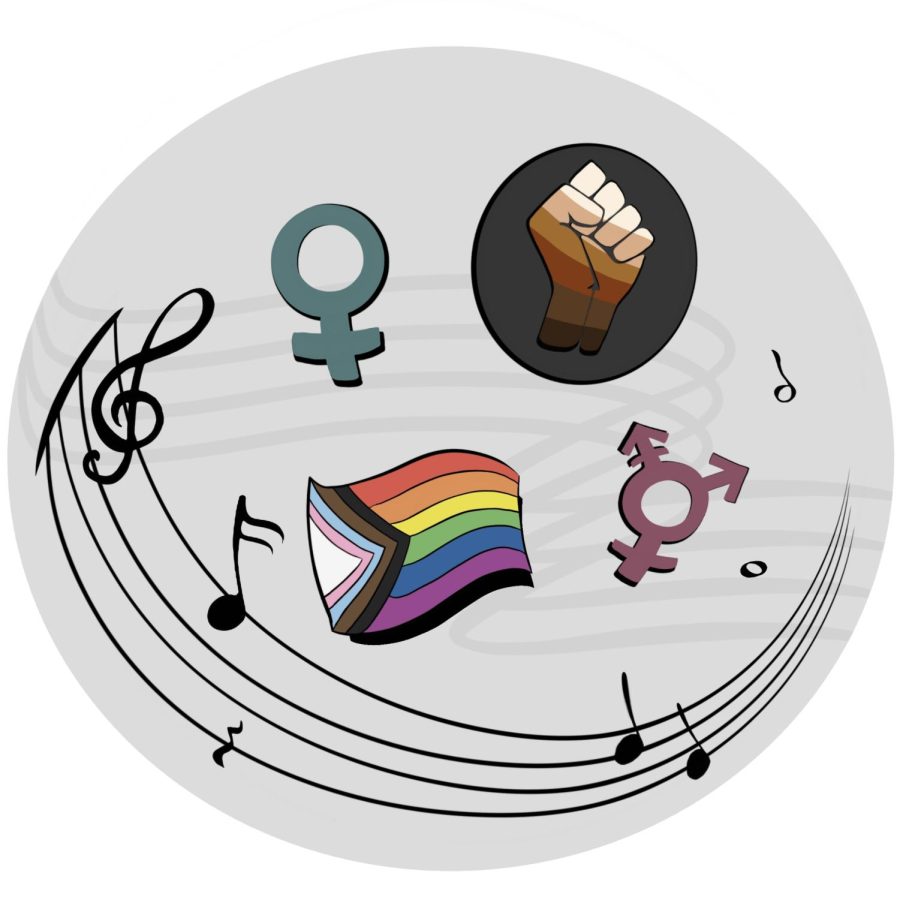MHS bands celebrate diversity through music
March 24, 2023
When most people think of classical music composers, some visualize portraits of Mozart and Beethoven in their fancy outfits and grey-haired glory. There is also Bach, Brahms, Dvořák, and Saint-Saëns. Those familiar with the classical music world can likely name several more.
Keep going down the list. How long does it take to start saying the names of female composers? Composers of color? Queer composers? How many of their works can we list? How many people can confidently say that they are as familiar with diverse composers as they are with the “traditional” white, cisgender, male composers of Europe?
Kevin Kleindl, the new band director at Minnetonka High School, is asking these same questions as he chooses pieces for his classes.
“About eight years ago, I really took a self-dive into how I program music and realized that I was programming a lot of [music by] old, white, dead guys,” said Kleindl. “It wasn’t a fair or accurate representation of my students, whether it be by gender, people of color versus white, or LGBTQ+ compared to straight. It made me think about how I need to represent my students better with the pieces that I choose.”
Since arriving at Minnetonka, about 90% of the pieces Kleindl has ordered for his classes are by female composers, composers of color, or queer composers. This is a significant upgrade for the music library in terms of diversity, and the positive effects are already being felt at MHS’s band concerts this year.
In December, Wind Ensemble performed “Before the Sun”, by queer and female composer Julie Giroux, “March Bou-Shou” by Japanese composer Satoshi Yagisawa, and “A Mother of a Revolution!” by Guyanese-American composer Omar Thomas. Thomas composed the piece in honor of the 1960s Stonewall riots that sparked the LGBTQ+ rights movement in the US.
“Having such a piece composed for trans rights was super important to me to play and represent my students with,” said Kleindl, “[Yagisawa] is probably one of my favorite composers. All of his music is so epically awesome.”
For Kleindl, representation is his top priority, as well as the number one reason why programming diverse composers is so important to him.
“I want to make sure that all of my students feel welcome and can see themselves in a piece of music that they have,” he explained. “It’s so often that you see a white composer’s, specifically male, name at the top of the page, and maybe someone will take it as, ‘Only white males can compose.’ And that couldn’t be further from the truth.”
“As a teacher, I want to make sure that my classroom is a safe space for everyone, and that everyone has equal representation, or as [close to] equal as possible,” he added.
The music industry has a strong tendency to prioritize cisgender, white, male composers over other composers, making it difficult to find music that falls outside of the traditional, Eurocentrically-oriented “standard repetoire”; Kleindl suggested that the easiest way to search for diverse composers is by doing a simple Google search or looking through the websites of diverse composers to find more of their works. He also recommended the Institute for Composer Diversity, a database where users can search for different types of composers and music (www.composerdiversity.com).
In addition to searching for diverse composers to program, Kleindl is also conscientious when deciding which composers not to program.
“There are a couple of composers that I will not perform anymore, one because he appropriated Asian culture and used a pen name, of what looked like an Asian female name, to make money…there was another composer that made some very transphobic comments on social media, and I will never play his music either because I don’t want to support that,” explained Kleindl.
Axel Martin, ‘23, is a percussionist in Wind Ensemble and enjoys the diversity of this year’s band repertoire. “I really enjoyed playing pieces by these diverse composers because their styles of composing are vastly different from the composing styles of more ‘traditional’ composers,” Martin said.
Martin said that they would like to see even more diverse repertoire at school in the future, as playing such pieces “not only highlights the diversity of today’s composers but also the diversity of young musicians.”
When asked about their personal favorite diverse composers, Martin shared that they enjoy listening to Ivan Trevino’s percussion ensemble pieces, as well as Christopher Tin and Erika Svanoe’s music. One of their favorite composers who is quite well-known and classically-rooted is Leonard Bernstein, the renowned conductor and composer behind the creation of West Side Story, who was queer.
“Equal representation of composers in music is rather a new thing in the music world, as disgusting as that is to say,” said Kleindl. “It’s sad that this has only been a [popular] mindset of musicians over the last 10 years.”
Indeed, there is still much work that needs to be done to bridge the gap that exists between the representation of diverse composers and traditional composers in the music world. As Kleindl and his classes have been demonstrating this year, a bit of additional research and thoughtfulness can go a long way in uplifting the experiences of diverse composers, and through those experiences, the identities of the students who see themselves represented in the pieces that they perform.
“Is it a little extra work on my part?” Kleindl said about his commitment to diversifying his repertoire, “Yeah. But I’d rather do that work because the outcomes are so much greater for my students than anything else.”






























